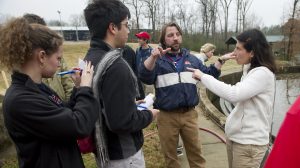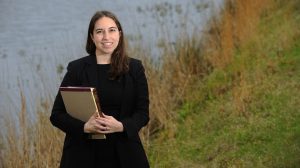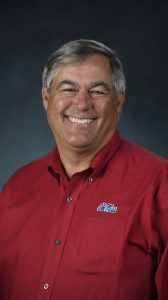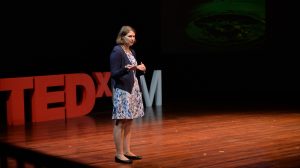
Cris Surbeck (at right in white shirt) takes a group of students on a tour of a wastewater treatment plant as part of their coursework. Photo by Robert Jordan/Ole Miss Communications
OXFORD, Miss. – Four University of Mississippi professors will join researchers from across the Southeastern Conference for a two-day academic conference examining water and climate issues.
“The Future of Water: Regional Collaboration on Shared Climate, Coastlines and Watersheds” is set for March 27-28 at Mississippi State University. UM presenters include Catherine Janasie, senior research counsel in the Mississippi Law Research Institute; Scott Knight, director of the UM Field Station; and Cris Surbeck, associate professor of civil engineering. Stephanie Showalter-Otts, director of the National Sea Grant Law Center, will serve as a moderator.
More than 60 scientists, representing all 14 SEC institutions, the National Oceanic and Atmospheric Administration, U.S. Department of Agriculture, U.S. Geological Survey and Environmental Protection Agency, are scheduled to participate.
“This conference will bring together the best of the best in the SEC doing water research,” said Daniel Petrolia, an MSU associate professor of agricultural economics and one of the conference organizers. “We will tackle some of the most pressing water issues facing the Southeast, the U.S. and the world.”
Knight will participate in a panel discussion of nonpoint source pollution and best management practices for dealing with it. Surbeck is moderator for the session.

Stephanie Showalter-Otts conducts research at the UM Field Station. Photo by Robert Jordan
As part of a panel on emerging water law and policy issues, Janasie will present “Mississippi v. Tennessee – the Interstate Groundwater Dispute.”
“I will be covering the United States Supreme Court case over the use of groundwater near the Mississippi-Tennessee border, which focuses on Memphis’ water pumping and how that affects Mississippi’s water resources,” Janasie said. “My talk will also cover how freshwater is allocated and how interstate disputes are traditionally handled by the Supreme Court.
“The Supreme Court has never handled an interstate dispute over groundwater, so the case is groundbreaking law.”
Janasie said she hope those in attendance will learn about the specific laws concerning how freshwater is allocated, that surface water – lakes, rivers, streams – and groundwater – aquifers – are treated differently under the law, and that interstate disputes have another specific set of rules that apply to them.

Scott Knight is director of the UM Field Station. Photo by Thomas Graning/Ole Miss Communications
“I also hope they learn that even though Mississippi seems to have an abundance of water resources, Mississippi relies heavily on groundwater,” she said. “That’s where we get about 90 percent of the water we use, so the case has big implications for both Mississippi, the city of Memphis and the innumerable other places throughout the country who rely on groundwater.”
Surbeck said that the intention of her session is to get academics together to discuss areas of research necessary to improve the characterization, modeling and management of pollution in water bodies that comes from storm water runoff.
Headlining the conference are best-selling author John M. Barry, former National Geographic executive environment editor; Dennis Dimick, professor at the University of California at Irvine; and Jay Famiglietti, senior water scientist at NASA’s Jet Propulsion Laboratory.
Increased climate variability and water demand are bringing water issues to the forefront of research discussion, conference organizers said. Drought, declines in aquifers used for irrigation and sea-level rise are among core topics of interest.
The conference is designed to stimulate communication and collaboration aimed at sustainable and resilient water resource management in the Southeast, with overarching themes to include shared inland waters and aquifers, coastlines, climate and regional policy.

Catherine Janaskie presents during last year’s TEDXTalk at UM. Submitted photo
The SEC Academic Conference is an expanded slate of academic programming that is expected to showcase SEC university research in areas of critical importance within the region and around the nation.
For the complete agenda and registration, visit http://www.secconference.msstate.edu.